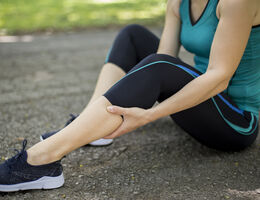
July 1, 2024—Whether you're training for a marathon or simply enjoying a game of pickleball in the sun, if you're active outdoors in the heat, you're at risk for heat cramps.
Heat cramps, also called exercise-associated muscle cramps, are painful contractions (cramps) of muscles during or after exercise. They're considered a mild form of heat illness, and they're most common during hot weather. But they can affect anyone who's working up a sweat, including:
- Athletes.
- Manual laborers.
- Military trainees.
Researchers are still learning about what causes these cramps, reports the Society for Neuroscience. Some link heat cramps to an electrolyte imbalance, caused by excessive sweating. But studies haven't confirmed that link. Instead, some researchers think the problem may be caused by misfiring motor neurons. Fatigue—and repetitive motion—may trigger muscles to cramp.
How to treat heat cramps
There are ways to treat heat cramps, but they may not be what you think. For example, eating a banana won't stop the painful cramping.
Here's what may help, based on advice from the American Osteopathic Association, the Centers for Disease Control and Prevention (CDC) and other experts:
- Rest in a cool place, such as inside an air-conditioned space or in a well-shaded area.
- Massage the area that's cramping. It's a simple step that can ease the pain.
- Gently stretch the muscle that hurts for 30 to 60 seconds.
- Replace the salt you've lost through sweating by drinking something with sodium in it, like a sports drink, or eating a salty snack.
Recognize a heat emergency
Drinking extra water—or even sports drinks—can't cancel out a serious electrolyte imbalance. If your symptoms are severe or you're concerned about dehydration, seek medical care right away.
According to CDC, heat cramps can be a sign of an emergency if:
- They last longer than an hour.
- You are on a low-sodium diet.
- You have heart problems.
Heat illness can be life-threatening. If you're active outdoors this summer, play it safe. Know the signs of heat illness—and when to call 911.
Sources
- American Osteopathic Association. "Coping With Muscle Cramps." https://osteopathic.org/what-is-osteopathic-medicine/muscle-cramp.
- BrainFacts.org. "What Causes Muscle Cramps?" https://www.sfn.org/sitecore/content/home/brainfacts2/thinking-sensing-and-behaving/pain/2020/what-causes-muscle-cramps-070220.
- Have a Plant. "Performance Nutrition: Bananas, Cramps and the Real Deal on Hydration and Electrolytes." https://fruitsandveggies.org/stories/performance-nutrition-bananas-cramps-real-deal-hydration-electrolytes.
- Journal of Athletic Training. "An Evidence-Based Review of the Pathophysiology, Treatment, and Prevention of Exercise-Associated Muscle Cramps." https://www.ncbi.nlm.nih.gov/pmc/articles/PMC8775277.
- Merck Manual. "Heat Cramps." https://www.merckmanuals.com/home/injuries-and-poisoning/heat-disorders/heat-cramps.
- UpToDate. "Exertional Heat Illness in Adolescents and Adults: Management and Prevention." https://www.uptodate.com/contents/exertional-heat-illness-in-adolescents-and-adults-management-and-prevention.